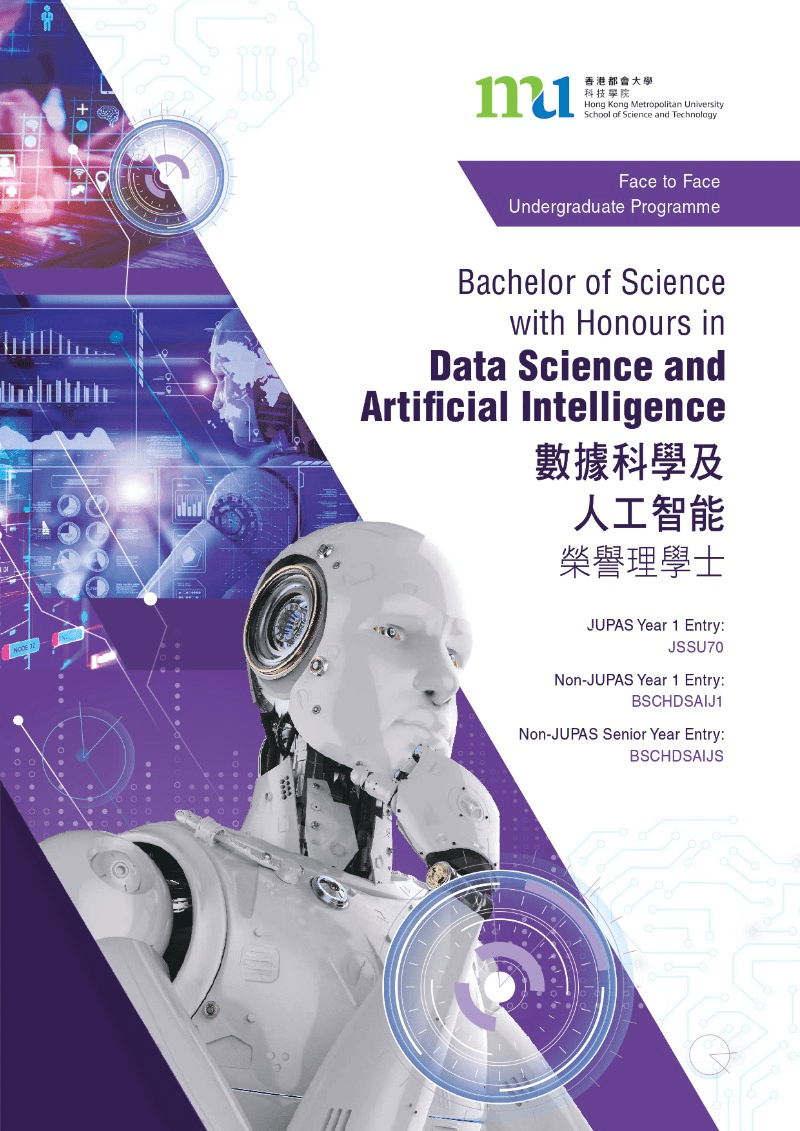Core Courses: Provide intermediate training in some of the major pillars in modern computing: processing of information, networking of information, and management of information.
Include programming, software development, software engineering, computing infrastructure, and databases.
| Code |
Title |
Credits |
Course Level |
Honours Classification |
| COMP 2020SEF |
Java Programming Fundamentals |
3 |
Middle |
– |
|
Java is one of the most popular languages in the IT professional world. The aim of this course is to provide students with sound foundation in software development using the object-oriented programming language Java.
The course will cover fundamental object-oriented programming concepts such as classes and objects, and the structure of text-based Java applications.
Students will study how to analyze problems and apply object-oriented methodology in software development.
|
| Code |
Title |
Credits |
Course Level |
Honours Classification |
| COMP 2030SEF |
Intermediate Java Programming and User Interface Design |
3 |
Middle |
– |
|
This course aims to provide students with more knowledge in Java programming as well as an introduction to user interface design. Students will study how to design computer user interface, and develop graphical-based computer programs using the Java programming language.
Students will also study how to analyse more difficult problems and apply object-oriented methodology in development.
|
| Code |
Title |
Credits |
Course Level |
Honours Classification |
| COMP 2090SEF |
Data Structures, Algorithms, and Problem Solving |
3 |
Middle |
– |
|
As a sequel to COMP 1080SEF, the aim of this course is to facilitate students to acquire skills for writing larger programs effectively.
Students will study how program structures, software development process, data structures, and algorithms can be used to deal with larger programming tasks. Topics include modular programming, abstract data types, searching and sorting, recursion, and data structures such as linked lists, binary trees, and hash-tables.
|
| Code |
Title |
Credits |
Course Level |
Honours Classification |
| COMP 2640SEF |
Discrete Mathematics |
3 |
Middle |
– |
|
The aim of this course is to lay the foundation of discrete mathematics of students which will be used in studying other more advanced programming courses.
Students will study the concepts of discrete mathematics, using different techniques for analysing and solving discrete mathematical problems. Topics include sets, functions, equivalence and induction.
|
| Code |
Title |
Credits |
Course Level |
Honours Classification |
| COMP 3130SEF |
Mobile Application Programming |
3 |
Higher |
– |
|
The course aims to provide students with a foundation in designing and developing Android applications. Students will study the architecture of the Android platform, design and implement basic Android applications, and apply Android APIs in mobile programming.
|
|
Advisory Pre-requisites: Students should have completed most foundation and middle level computing programming courses.
|
| Code |
Title |
Credits |
Course Level |
Honours Classification |
| COMP 3200SEF |
Database Management |
3 |
Higher |
– |
|
This course aims to provide an explanation of the concepts underlying all relational databases as well as practical experience in applying the concepts in different situations.
Students should develop knowledge about the role of databases and database management systems within the context of information systems. Students should also develop skills in using the database language SQL. Major topics include database environment, database architectures, relational model and database design.
|
| Advisory Pre-requisites: Students should have completed most foundation and middle level computing programming courses. |
| Code |
Title |
Credits |
Course Level |
Honours Classification |
| COMP 3500SEF |
Software Engineering |
3 |
Higher |
– |
|
he course aims to develop in learners the terminology, notations and understanding needed for effective communication with team members during software engineering activities. It also aims to equip learners with the skills to apply software engineering methods and tools in a variety of situation.
|
| Advisory Pre-requisites: Students should have completed most foundation and middle level computing programming courses. |
| Code |
Title |
Credits |
Course Level |
Honours Classification |
| COMP 3510SEF |
Software Project Management |
3 |
Higher |
– |
|
As a sequel to COMP 3500SEF, This course aims to develop in learners the know-how of project management recognized as good practices in software development.
|
| Advisory Pre-requisites: Students are expected to have completed at least two semester courses in computer programming and COMP 3500SEF Software Engineering. |
| Code |
Title |
Credits |
Course Level |
Honours Classification |
| COMP 3810SEF |
Server-side Technologies and Cloud Computing |
3 |
Higher |
– |
|
This course introduces some of the contemporary techniques, technologies and tools for designing, constructing and deploying flexible server-side Internet applications.
One of the main focuses of this course is to explain and demonstrate the use of cloud computing technologies. Students will learn how to design, construct and deploy scalable and cost-effective applications that are readily deployable on commercial cloud platforms.
The topic may include tools for cloud app development, essential cloud technologies such as linux & git, NoSQL, server-side scripting, server-side MVC, service-oriented architecture, RESTful web services, virtualization, cloud computing concept, service and pricing models, writing and deploying cloud apps. |
| Advisory Pre-requisites: Students should have completed most foundation, middle and higher level computing courses. |
| Code |
Title |
Credits |
Course Level |
Honours Classification |
| COMP 3920SEF |
Machine Learning |
3 |
Higher |
– |
|
This course aims to introduce students to the field of machine learning, and develop them to apply machine learning algorithms to real-world problems. It enables students to have a broad overview of different machine learning and deep learning algorithms with a focus of applying these algorithms into real-world problems through practical activities.
|
| Advisory Pre-requisites: Students should have a solid background in computing. |
| Code |
Title |
Credits |
Course Level |
Honours Classification |
| STAT 2510SEF |
Statistical Data Analysis |
3 |
Middle |
– |
|
| Code |
Title |
Credits |
Course Level |
Honours Classification |
| STAT 2520SEF |
Applied Statistical Methods |
3 |
Middle |
– |
|
| Code |
Title |
Credits |
Course Level |
Honours Classification |
| STAT 2610SEF |
Data Analytics with Applications |
3 |
Middle |
– |
| This course aims to introduce a range of topics and concepts related to the data science process. Students will learn what Data Science is and the skill sets needed to be a data scientist, how to use R to carry out basic statistical modeling and analysis. Students will also learn the significance of exploratory data analysis (EDA) in data science, the Data Science Process and how its components interact. |
| Code |
Title |
Credits |
Course Level |
Honours Classification |
| STAT 2630SEF |
Big Data Analytics with Applications |
3 |
Middle |
– |
|
| Code |
Title |
Credits |
Course Level |
Honours Classification |
| STAT 3110SEF |
Time Series Analysis & Forecasting |
3 |
Higher |
– |
|
| Code |
Title |
Credits |
Course Level |
Honours Classification |
| STAT 3660SEF |
SAS Programming |
3 |
Higher |
– |
|
| Code |
Title |
Credits |
Course Level |
Honours Classification |
| IT 2900SEF |
Human Computer Interaction & User Experience Design |
3 |
Middle |
– |
| This course consists of two parts. In the first part, students will learn the important theories that underpin the way humans interact with computer-based systems. In the second part, students will learn how to use disciplined approaches to (a) design usable and intuitive interfaces for computer-based systems, and (b) evaluate and compare different interface design with respect to their usability and intended user/business requirements.
This course introduces students to the key concepts, theories and best practices used by user experience engineers to design usable interfaces and improve the quality of interaction with computer-based systems. |
| Code |
Title |
Credits |
Course Level |
Honours Classification |
| MATH 2150SEF |
Linear Algebra |
3 |
Middle |
– |
|
This course is intended to provide conceptual understandings and computational techniques of linear algebra. Linear algebra has wide applications to diverse areas in natural science, engineering, business and social science. The course is made up of seven study units: Five units cover linear algebra and the remaining two units deal with real numbers analysis and convergence of the sequence.
|














